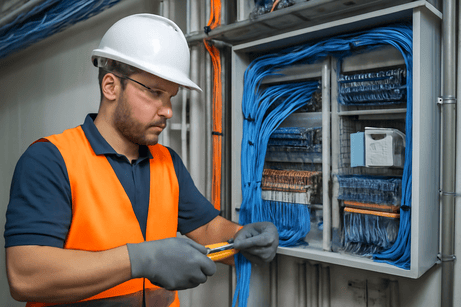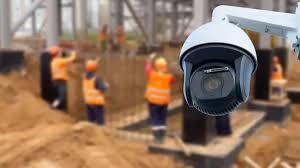The Power of Precision: Why Low Voltage Wiring Contractors Lead the Pack

The construction industry has seen a technological renaissance, and the demand for sophisticated systems in buildings continues to grow. Smart homes, office buildings with integrated security systems, and smart factories are becoming the norm.
Behind all of this advanced infrastructure are low voltage wiring contractors, whose role is more important than ever. These specialists are tasked with installing, maintaining, and optimizing the wiring systems that power these modern technologies.
From high-speed internet cabling to fire alarms and energy-efficient lighting systems, wiring contractors ensure that the underlying infrastructure is set up properly and performs at its best. The work these contractors do is intricate and crucial for the seamless operation of today’s smart buildings. Their skills, expertise, and precision are what allow these modern systems to function optimally.
Let’s dive into why low voltage wiring contractors are leading the pack in the building sector and how their expertise is driving innovation in the building industry.
What Are Low Voltage Wiring Contractors?
Low voltage wiring contractors are professionals who specialize in installing and maintaining electrical systems that operate on low-voltage circuits (typically less than 50 volts). These systems include:
- Network cabling for internet and phone lines
- Security systems (cameras, access control)
- Fire alarm systems
- Building automation systems (smart lighting, HVAC controls)
- Audio/visual systems
Unlike traditional electrical work, which focuses on high-voltage systems for powering equipment, low voltage wiring contractors work with systems that enable communication, security, and energy efficiency. These contractors must have specialized knowledge of both electrical wiring and the integration of complex technologies that are often involved in modern infrastructure. Their work is both technical and strategic, requiring them to stay up-to-date with the latest innovations in building technology.
Why Low Voltage Wiring Contractors Are Leading the Charge
1. Increased Demand for Smart Systems
With the rise of the Internet of Things (IoT) and smart technologies, buildings are becoming more interconnected than ever before. From automated lighting and climate control to advanced security systems and data networks, the demand for low voltage wiring contractors has skyrocketed. These contractors are at the forefront of this transformation, ensuring that buildings are equipped to handle today’s technological demands.
Buildings today rely heavily on systems that communicate with one another to provide energy efficiency, safety, and convenience. These systems often require complex wiring installations that must be done with precision and expertise. Low voltage wiring contractors are the professionals who make this possible by installing the intricate network of wiring that connects everything from security cameras to climate control systems.
2. Precision and Expertise
The hallmark of a low voltage wiring contractor is precision. Unlike traditional electrical contractors who deal with high-voltage circuits, low voltage wiring involves careful planning, installation, and maintenance to ensure everything works seamlessly. Wiring must be organized, secured, and tested meticulously to avoid signal interference and performance issues. This level of attention to detail is why low voltage wiring contractors are in high demand.
Whether it’s setting up a structured network cabling system for a corporate office or ensuring that a building’s security system is connected properly, low voltage wiring contractors have the skills to ensure these systems operate at optimal
efficiency.
3. Technological Integration and System Integration
The role of low voltage wiring contractors is also essential in integrating the various technological systems within a building. With smart buildings becoming more common, the need for contractors to integrate sophisticated systems has grown. These systems need to be connected in ways that allow them to work together seamlessly, requiring the specialized skills of low voltage contractors.
For example, a contractor may install the wiring for a building’s security system, ensuring that the cameras, access controls, and alarm systems are connected to a central monitoring system. At the same time, they may also work on wiring for smart lighting, climate control, and audio-visual systems—all of which need to work together to provide a cohesive user experience.
By understanding how each system interacts with others, low voltage wiring contractors can ensure that all systems in a building are connected in the most efficient way possible, reducing conflicts and improving overall performance.
4. Efficiency and Sustainability
Another key factor driving the success of low voltage wiring contractors is their ability to install energy-efficient systems. As more buildings are built with sustainability in mind, energy-saving systems such as smart lighting and automated climate control have become crucial. Low voltage wiring contractors play a major role in installing and maintaining these systems, ensuring that they are optimized for performance and energy efficiency.
By working with advanced building technologies, low voltage wiring contractors are not only improving the functionality of buildings but also contributing to sustainability efforts. Through precise wiring and system installation, they help ensure that buildings consume less energy and operate more efficiently.
The Growing Scope of Low Voltage Wiring Work
As more construction projects integrate advanced technology, the scope of work for low voltage wiring contractors has expanded. Here’s a look at some of the areas where their expertise is now in high demand:
1. Smart Homes and Offices
The demand for smart homes and smart offices is booming, and low voltage wiring contractors are essential to these projects. These buildings rely on automated systems for lighting, heating, cooling, security, and entertainment. Contractors must install wiring systems that allow all these components to communicate and function together.
For example, in a smart home, low voltage wiring contractors might install the wiring for motion sensors, smart lighting, automated blinds, and home security cameras. The systems must be integrated in a way that ensures everything functions as one cohesive unit.
2. Security and Surveillance Systems
As security concerns grow, more buildings are turning to advanced surveillance and access control systems. Low voltage wiring contractors are critical to installing these systems, ensuring that cameras, alarms, and access points are properly wired and integrated.
The ability to install and maintain complex security systems has become a core skill for low voltage wiring contractors, and their expertise ensures that these systems function correctly, protecting both buildings and occupants.
3. Data Networks
The installation of data networks is another key responsibility of low voltage wiring contractors. Today’s commercial buildings, campuses, and residential complexes rely heavily on high-speed internet connections and data communication. Properly wired network systems are essential for smooth operations.
Contractors install the cables, routers, and network equipment necessary for these systems to operate. Their expertise ensures that internet speeds are fast, connections are stable, and that data is transmitted securely throughout the
building.
Why Choose Low Voltage Wiring Contractors for Your Next Project?
As buildings continue to grow more technologically sophisticated, the role of low voltage wiring contractors will only continue to increase. These contractors play a vital role in integrating complex systems, ensuring they are installed efficiently and with precision. Their skills help buildings become smarter, more energy-efficient, and more secure—ultimately improving the functionality of the entire structure.
In today’s construction landscape, the demand for skilled low voltage wiring contractors is on the rise, and those who specialize in this area will continue to lead the way in creating tomorrow’s smart buildings.
Conclusion
The role of low voltage wiring contractors is pivotal in shaping the future of construction. These professionals are at the forefront of integrating advanced technology into modern buildings, ensuring that systems operate seamlessly, efficiently, and sustainably.
As the building industry embraces smarter, more connected infrastructure, low voltage wiring contractors will continue to play a vital role in ensuring that buildings not only meet modern demands but also remain adaptable to future innovations.
Note: IndiBlogHub features both user-submitted and editorial content. We do not verify third-party contributions. Read our Disclaimer and Privacy Policyfor details.






